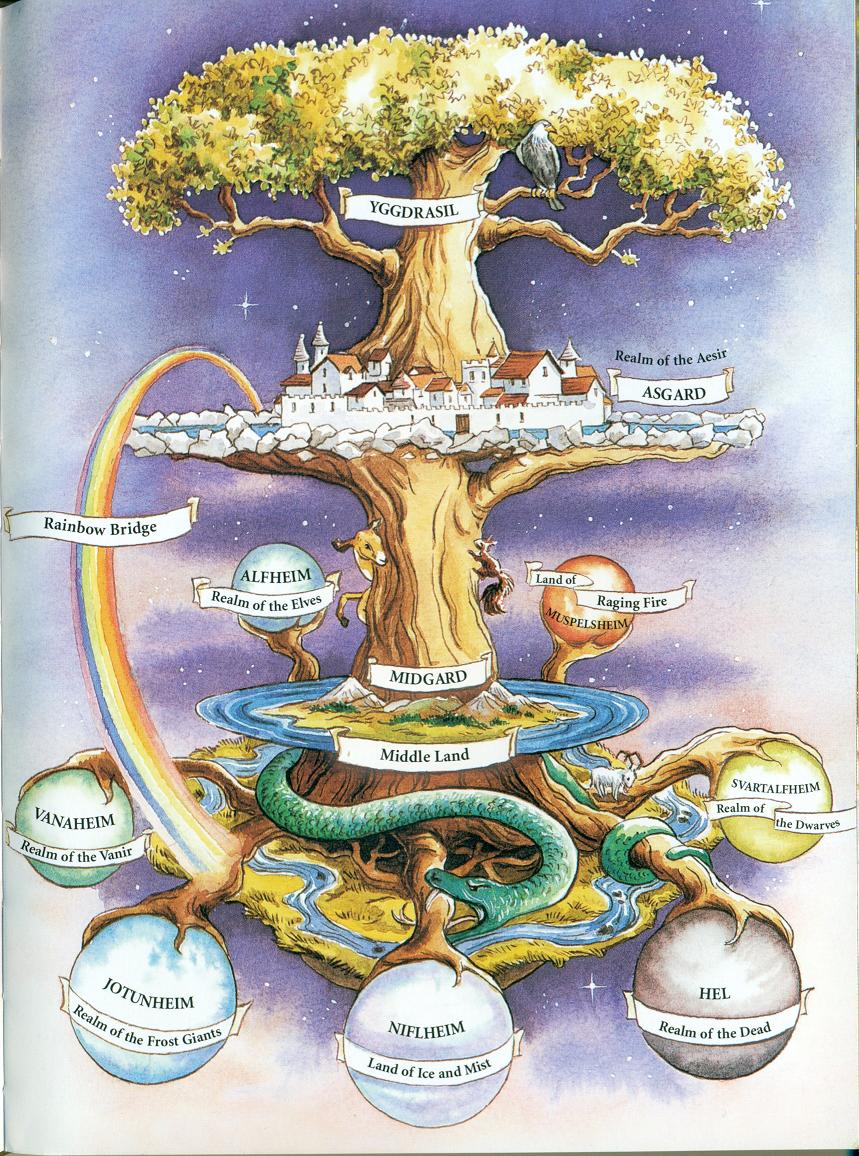The Creation of the World in Norse Mythology

This mytholgy explain that before there were the Earth, the sky or anything. There were only a place called Nilfheim, which was in the nothern region of Ginnunngagap, was homeland of the element of ice; Muspelheim, which was in the south region of Ginnungagap, was the homeland of the element of fire; and for last in the middle of this two places was Ginnungagap that was a vast emptiness ang great void.
Elivagar are the rivers which existed in Niflheim at the beginning of the cosmos. Elivarg was flowing down the mountains to the plains of Ginnungaga, where it solidified to frost an ice, which gradually formed a very dense layer. And from Muspelheim came lava and sparks into the great void Ginnungagap. In the middle of Ginnungagap the fire melted the ice and it began to drip cusin the creation of the Jotun called Ymir. While Ymir sleep, two more giants grew under his arm ( one male and on Male), and a third appeared of his legs a son Thrudgelmir.
Also from the drip a giant cow called Audhumla was created, who proporse was to fed the Jotuns. This animal fed herself on a block of salt ice, and while she was liking on the rock something strange happen, the first god appeared who was called as Buri.

Buri had a son called Boor and he got married to Bestla, a Jotun woman. Bor an Bestla had threes sons: Odin, Vili, and Ve.
The three brothers anoyment by the fact that the Jotuns were outnumered. They decided to kill Yimir, because they wnated to erradicated all the Jotuns and the only solution was to kill him, due the fact that he was still conceiving new Jotuns. At the end of the battle they killed Ymir, and only a couple of Jotuns survived: Belgelmir and his wife.
The three brothers created the world "Midgard", with the remains of Ymir. Then they created the humans, when they found two logs: one from the Ash tree and other from the Elm tree. Odin gave th logs spirit and life; Ve gave them movement, mind and intelligence; and Vili gave them shape, speech, feelings, and the five senses.With this the first two human had been created: the man eith the name of Ask and the women with the name of Embla.
Sources:
 Pangu is the first living being and the creator of all. This myth explin us how P´an Ku was hatched from a cosmic egg. Half the shell is above him as the sky, the other half below him was the earth. The myth explain that he grew taller each day for 18, 00 years, gradually pushing them apart until they reach their appointed places. After all this effort P´an KU falls to pieces. His limbs becom the mountains, his blood the river, his breath the wind and his voice the thunder. His two eyes are the sun anf the moon; and for last the parasites on his body are humans.
Pangu is the first living being and the creator of all. This myth explin us how P´an Ku was hatched from a cosmic egg. Half the shell is above him as the sky, the other half below him was the earth. The myth explain that he grew taller each day for 18, 00 years, gradually pushing them apart until they reach their appointed places. After all this effort P´an KU falls to pieces. His limbs becom the mountains, his blood the river, his breath the wind and his voice the thunder. His two eyes are the sun anf the moon; and for last the parasites on his body are humans.






